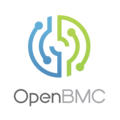
Summary
The OpenBMC project is a Linux Foundation collaborative open-source project that produces an open source implementation of the baseboard management controllers (BMC) firmware stack.[1][2][3] OpenBMC is a Linux distribution for BMCs meant to work across heterogeneous systems that include enterprise, high-performance computing (HPC), telecommunications, and cloud-scale data centers.[3][4]
 | |
| Developer(s) | OpenBMC community |
|---|---|
| Initial release | 3 November 2015 |
| Stable release | 2.14.0
/ 16 May 2023 |
| Repository | github |
| Written in | C, C++ |
| Available in | Mainly English |
| License | Apache License 2.0 |
| Website | www |
History edit
In 2014, four Facebook programmers at a Facebook hackathon event created a prototype open-source BMC firmware stack named OpenBMC.[5] In 2015, IBM collaborated with Rackspace on an open-source BMC firmware stack also named OpenBMC. These projects were similar in name and concept only.[6] In March 2018, OpenBMC became a Linux Foundation project and converged on the IBM stack. Founding organizations of the OpenBMC project are Microsoft, Intel, IBM, Google, and Facebook.[7][3] A technical steering committee was formed to guide the project with representation from the five founding companies. Brad Bishop from IBM was elected chair of the technical steering committee.[8] In April 2019, Arm Holdings joined as the 6th member of the OpenBMC technical steering committee.[9]
Features edit
OpenBMC uses the Yocto Project as the underlying building and distribution generation framework.[10] The firmware itself is based on U-Boot.[11] OpenBMC uses D-Bus as an inter-process communication (IPC).[12][13] OpenBMC includes a web application for interacting with the firmware stack.[14] OpenBMC added Redfish support for hardware management.[15]
Systems edit
- Google/Rackspace partnership
- Barreleye G2 / Zaius—two-socket server platform using POWER9 processors.[16][17]
- IBM
- Power Systems AC922 also "Witherspoon" or "Newell"—two-socket, 2U Accelerated Computing (AC) node using POWER9 processors with up to 6 Nvidia Volta GPUs.[18][19] AC922 was used in the U.S. Department of Energy's Sierra and Summit supercomputers.[20][21]
- Power System's S1024, L1024, S1022, L1022, S1022, S1014, and E1050 – 1-4 socket Power10 systems[22]
- Raptor Computing Systems / Raptor Engineering
- Talos II—two-socket workstation and development platform; available as 4U server, tower, or EATX mainboard.[23][24]
- Talos II Lite – single-socket version of the Talos II mainboard, made using the same PCB.[25]
- Blackbird – single-socket microATX platform using SMT4 Sforza POWER9 processors, 4–8 cores, 2 RAM slots (supporting up to 256 GiB total)[26]
References edit
- ^ "Projects - The Linux Foundation". The Linux Foundation. Retrieved 2018-03-19.
- ^ "Power of Open(Source)BMC - OpenPOWER". OpenPOWER. 2016-02-02. Retrieved 2018-01-05.
- ^ a b c "OpenBMC Project Community Comes Together at The Linux Foundation to Define Open Source Implementation of BMC Firmware Stack - The Linux Foundation". The Linux Foundation. 2018-03-19. Retrieved 2018-03-19.
- ^ "The Firmware Stack Opens Up". EnterpriseTech. 2018-03-20. Retrieved 2018-03-21.
- ^ "Introducing "OpenBMC": an open software framework for next-generation system management". Facebook Code. 10 March 2015. Retrieved 2018-01-05.
- ^ "Differences between facebook/openbmc and openbmc/openbmc · Issue #589 · openbmc/openbmc". GitHub. Retrieved 2019-03-28.
- ^ "Home - OpenBMC". OpenBMC. Retrieved 2018-03-19.
- ^ "README: add Technical Steering Committee members · openbmc/docs@e28e782". GitHub. Retrieved 2019-08-31.
- ^ "Docs: Add Arm representative to the list of TSC members · openbmc/docs@560b4ca". GitHub. Retrieved 2019-08-22.
- ^ Wang, Xo (2017-05-22). "Developing on OpenBMC Under the hood with BitBake" (PDF). openpowerfoundation.org. Retrieved 2018-01-09.
- ^ Lei, Yu (2020-06-15). "BMC Management". developer.ibm.com. Retrieved 2023-10-25.
- ^ "OpenBMC, A Reference Firmware Stack - OpenPOWER". OpenPOWER. 2016-02-02. Retrieved 2018-01-09.
- ^ The OpenBMC Project, 2017-03-14, retrieved 2018-01-09
- ^ GitHub - openbmc/phosphor-webui: Reference WebUI for managing OpenBMC systems., openbmc, 2019-02-19, retrieved 2019-02-21
- ^ A do everything Redfish, KVM, GUI, and DBus webserver for OpenBMC: openbmc/bmcweb, openbmc, 2019-08-29, retrieved 2019-08-29
- ^ "Introducing Zaius, Google and Rackspace's open server running IBM POWER9". Google Cloud Platform Blog. Retrieved 2018-01-05.
- ^ OpenBMC: Boot your server with Python, 2016-08-15, retrieved 2018-01-09
- ^ "IBM Power System AC922 - Details - United States". www.ibm.com. 2018-01-05. Retrieved 2018-01-05.
- ^ Bader, David (2017-11-15). "The @IBM Power9 "Newell" compute node is the world's most accelerated node with next-gen NVLink to @NVIDIA #GPUs". @Prof_DavidBader. Retrieved 2018-01-05.
- ^ "Details Emerge On "Summit" Power Tesla AI Supercomputer". The Next Platform. 2016-11-20. Retrieved 2018-03-27.
- ^ "The Roadmap Ahead For Exascale HPC In The US". The Next Platform. 2018-03-06. Retrieved 2018-03-27.
- ^ "Managing OpenBMC-based and BMC-based systems by using the HMC". www.ibm.com. Retrieved 2023-11-05.
- ^ "A High Performance, Open, and Secure Alternative to X86 Computing". markets.businessinsider.com. Retrieved 2018-01-05.
- ^ "Raptor Computing Systems::TL2WK2 Intro". www.raptorcs.com. Retrieved 2018-01-05.
- ^ "Raptor Computing Systems::TL1MB1 Intro". www.raptorcs.com. Retrieved 2019-08-22.
- ^ "Raptor Computing Systems::BK1MB1 Intro". raptorcs.com. Retrieved 2019-08-22.


